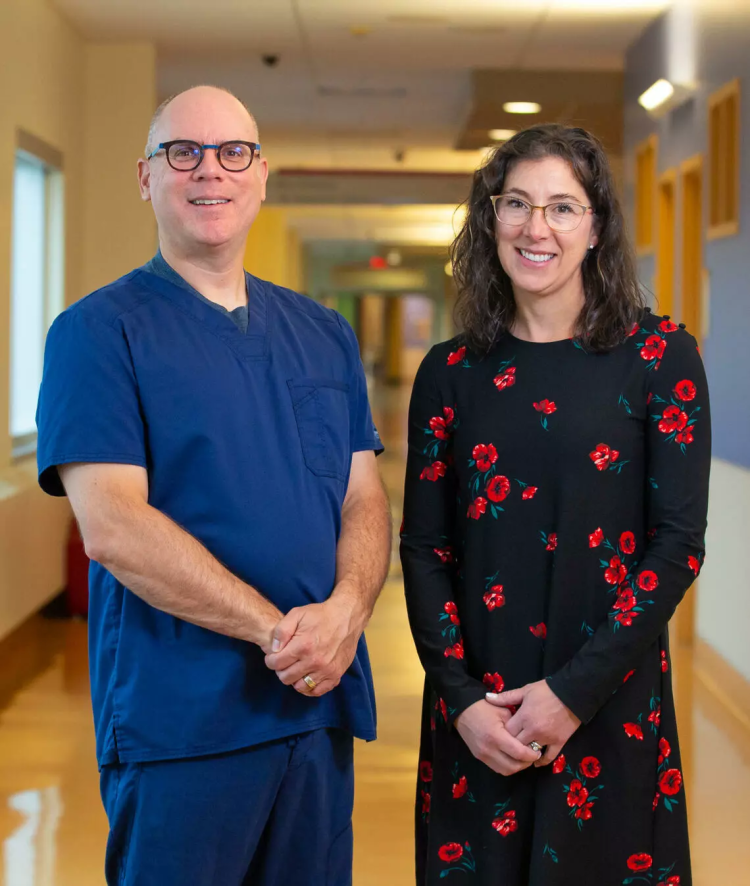"We have established an ovarian tissue cryopreservation (OTC) program in Calgary," says Dr. Shu Foong, MD'97, specialist in reproductive endocrinology and infertility and clinical assistant professor at the Cumming School of Medicine (CSM). "For the first time, prepubertal patients with ovaries who are facing cancer treatments that may impact their fertility have an option that they may be able to have their own biological child one day."
Ryan understands the devastating consequences of cancer treatment on fertility. As a boy, he was diagnosed with acute lymphoblastic leukemia. He underwent two years of chemotherapy. After being cancer-free for a time, the cancer returned and was localized to his testicles. He was too young to preserve sperm.
The radiation treatments were effective in stopping the cancer and saving Ryan's life, however the treatment left him infertile. When he married, and began family planning, Ryan and his wife investigated what options were available to them. In the end, Ryan's wife was able to conceive through invitro fertilization with donor sperm. Now, many years later Ryan was offered the chance to preserve fertility for his daughter.
"Michelle was only nine years old when we learned she had the same rare gene mutation that led to a fatal cancer diagnosis for her mother," says Ryan. "We knew the only way to prevent this aggressive cancer was preventive surgery. I could save Michelle's life, and thanks to Dr. Foong, I could also offer Michelle an opportunity to make her own decision about having her own children when she's ready."
Families first meet with an oncologist, who introduces the fertility preservation option as part of the care plan where a child or adolescent is facing aggressive chemotherapy and/or radiation therapy that is likely to impact their fertility. A person born with ovaries has all the eggs for their lifetime at birth. However, for patients who undergo high doses of chemotherapy or radiation therapy, it can sometimes cause them to go into premature menopause.
OTC involves removing a portion or the whole ovary through laparoscopy using a camera and small incisions before cancer treatment starts. The tissue is cryopreserved using a technique called slow-freezing or vitrification so that it may be reimplanted at a future date. Foong and colleagues, Drs. Sarah McQuillan, MD, and Gregory Guilcher, MD, say they've had an overwhelmingly positive response from families about the program.

Drs. Greg Guilcher and Sarah McQuillan. Photo Credit: Riley Brandt
"OTC is the only option for fertility preservation for a young girl who is prepubertal and sometimes also the only option for girls who are post puberty, depending on the specific situation," says Guilcher, a pediatric hematologist/oncologist and associate professor at CSM. "Having this expertise and leadership in Calgary is a wonderful option for our young patients and their families."
Preserving hope and building expertise to help more families
Cryopreservation of ovarian tissue is a relatively new technique, however in many places in the world it is no longer considered experimental and is now part of routine care that has resulted in hundreds of births worldwide.
Calgary is one of the few centres in Canada that routinely offers OTC as part of the standard of care embedded in the treatment process when starting high-risk treatment. The program started in 2015 after Foong returned from an international conference.
"I was attending a congress on oncofertility when I realized it was time for such a program to exist, not just here in Calgary, but also for Canadians," says Foong. "We started out just as a team of two. It was just Kim Parker, master of science in clinical embryology, and me. I am thrilled to say we have gone from a team of two to a multidisciplinary team involving social workers, nurses, physicians and scientists who are all collaborating for the betterment of our patient care."
McQuillan is the program director for the Pediatric and Adolescent Gynecology Fellowship, one of three in the country.
"This is our sixth year with the fellowship and we have been very lucky to train fellows that have both stayed in Calgary as well as established their practice all over the world and Canada," says McQuillan, clinical associate professor at the CSM.
"In terms of cancer, survival in the pediatric population in Canada is approaching 90 per cent, now. Reproductive potential in the future is so important because it gives them hope for a future 10, 20, 30 years down the road and that they will be able to build their own family with their own biological children if they would desire that in the future," says McQuillan.
The clinicians say the field of oncofertility is advancing quickly. Foong envisions expanding the program to include fertility preservation for pre-pubescent children with testes as well as ovaries.
"Many people are amazed at how fast science and technology have opened the doors for fertility care in children or adolescents facing cancer. What was once just a dream is now a reality and we sure hope to push that further. Other centres in the world are starting to show success with testicular tissue freezing," says Foong. "The technology is rapidly evolving. We want to continue to build our program to meet the needs of all our patients."









